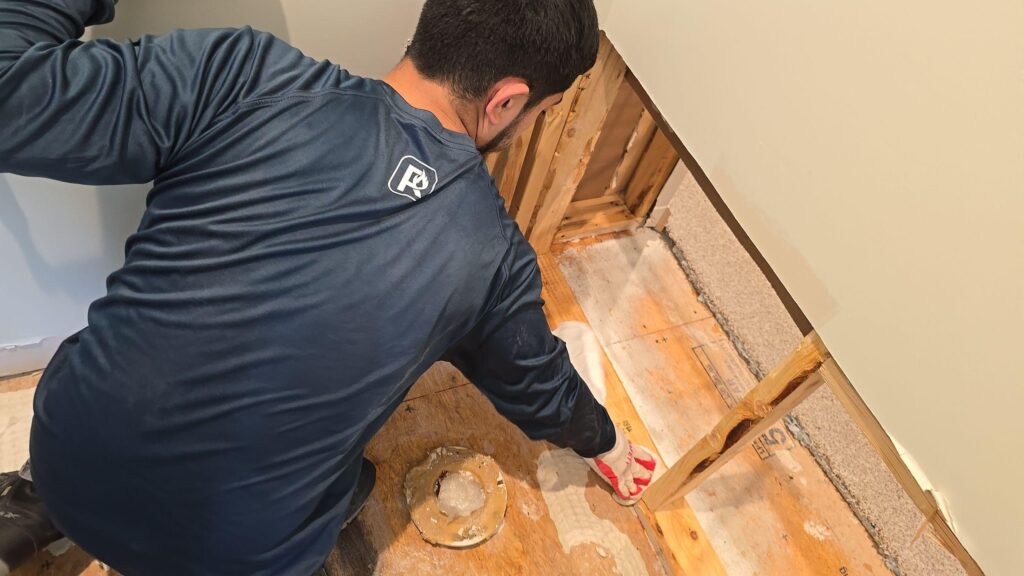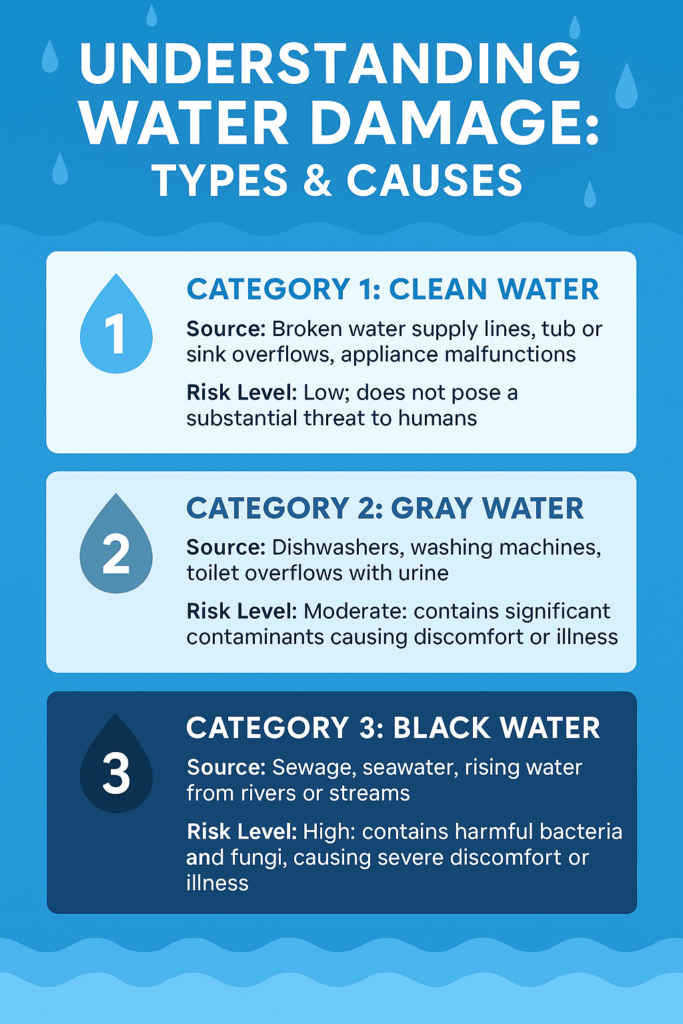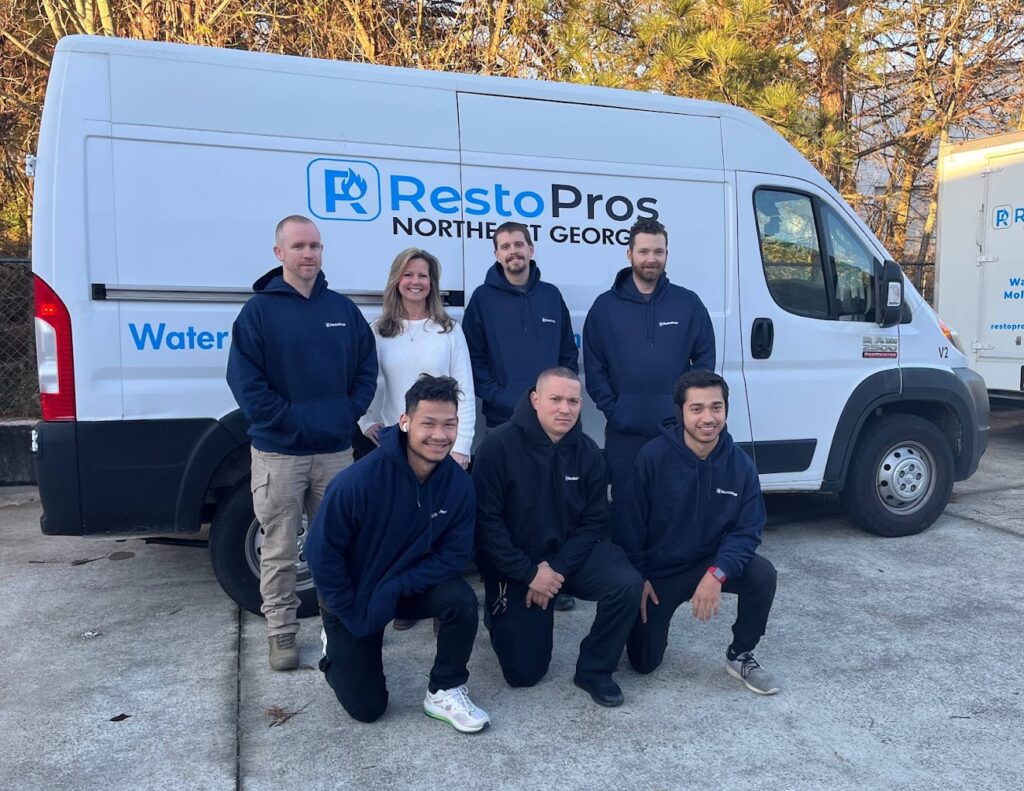
Water damage is one of the most common and destructive problems faced by homeowners and businesses in Lawrenceville, Georgia. Whether it’s a burst pipe during winter, a flooded basement after heavy spring rains, or a leaking roof during storm season, water intrusion can quickly escalate from a minor inconvenience to a major disaster. At RestoPros of Northeast Georgia, we’ve helped countless property owners recover from water damage emergencies, and we’ve found that understanding the types and causes of water damage is the first step in effective prevention and recovery.
What Exactly Is Water Damage?
Water damage refers to various possible losses caused by water intruding where it shouldn’t be. When water penetrates building materials like wood, drywall, insulation, or flooring, it begins a destructive process that can compromise structural integrity, create electrical hazards, and lead to serious health concerns through mold growth.
Unlike normal moisture that may be present in humid environments, water damage involves unwanted water accumulation that cannot naturally dissipate. This excessive moisture begins breaking down materials through processes like rotting, rusting, de-laminating, and mold proliferation.
The speed at which you address water damage directly impacts the extent of the damage. Water can spread quickly, seeping into floors, walls, and furniture within minutes. Within 24 hours, drywall begins to swell and break down, metal surfaces begin to tarnish, and furniture starts to warp and crack. And within 48-72 hours, mold and mildew may begin growing, doors and window frames warp, and even the structural wood in your home can swell and warp.
24/7 Emergency Water Damage Restoration Help
Facing a flood, pipe burst, or storm damage? RestoPros of Northeast Georgia is ready to respond anytime—day or night. Let our certified restoration team protect your home and peace of mind.
The Different Types of Water Damage
Water damage is categorized based on the cleanliness of the water and the extent of the affected area. Understanding these classifications helps professionals determine the appropriate restoration approach.

Categories of Water Damage (Based on Contamination Level)
Category 1: Clean Water This comes from a clean source that poses no substantial health risk. Examples include broken water supply lines, tub or sink overflows, or appliance malfunctions involving water supply lines. Though initially clean, Category 1 water can quickly degrade to Category 2 or 3 if left untreated, especially when in contact with contaminants like building materials, systems, and furniture.
Category 2: Gray Water This contains significant contamination and has the potential to cause discomfort or illness if consumed or exposed to humans. Sources include dishwasher or washing machine overflow, toilet overflow with urine (no feces), and sump pump failures. Gray water contains microorganisms and nutrients for microorganisms to grow.
Category 3: Black Water This is grossly contaminated water containing pathogenic agents, toxic, or harmful materials. Sources include sewage, toilet backflows from beyond the trap, flooding from rivers or streams, and standing water that has begun to support microbial growth. This type of water damage requires specialized handling and personal protective equipment.
Classes of Water Damage (Based on Rate of Evaporation)
Class 1: Slow Rate of Evaporation Affects only a portion of a room with materials that have absorbed minimal moisture. This is the easiest to deal with.
Class 2: Fast Rate of Evaporation Affects an entire room, including carpet and cushions. Water has wicked up the walls less than 24 inches.
Class 3: Fastest Rate of Evaporation Water typically comes from overhead, affecting ceilings, walls, insulation, carpet, and subfloors.
Class 4: Specialty Drying Situations Involves materials with very low porosity like hardwood, concrete, stone, and brick, which require special drying methods and longer drying times.
Common Causes of Water Damage in Lawrenceville Homes and Businesses
Understanding common causes can help you take preventative measures and know what to look for before problems escalate.
Plumbing System Failures
One of the most common causes we see in Lawrenceville properties includes:
- Burst pipes, especially during winter freezes
- Failing water heaters (typically after 10-15 years)
- Worn pipe joints and hose connections
- Clogged drains causing backups
- Hidden pipe leaks within walls
Appliance Malfunctions
Household appliances that use water can develop leaks or overflow:
- Washing machine hose failures
- Refrigerator ice maker line leaks
- Dishwasher leaks
- HVAC system condensation problems
- Water filtration system failures
Weather-Related Causes
Gwinnett County’s weather patterns contribute to these causes:
- Heavy rainstorms overwhelming drainage systems
- Roof leaks during Georgia’s summer thunderstorms
- Foundation cracks allowing water seepage
- Flooded basements during intense rainfall
- Ice dams during occasional winter freezes
Structural Issues
Problems with your property’s construction can lead to water intrusion:
- Poor exterior drainage around the foundation
- Improperly sealed windows and doors
- Damaged or clogged gutters and downspouts
- Aging roof systems with compromised shingles
- Cracks in foundation or exterior walls
HVAC System Problems
Your heating and cooling system can be a source of water damage:
- Condensation buildup in ductwork
- Clogged condensate drain lines
- Improper installation leading to leaks
- Frozen evaporator coils that later thaw and leak
- Excessive humidity causing condensation issues
Recognizing the Signs of Water Damage
Early detection of water damage can save thousands in repair costs. Here’s what to look for:
Visible Signs
- Water stains on ceilings, walls, or floors
- Bubbling or peeling paint or wallpaper
- Warping or buckling of flooring
- Visible mold growth
- Standing water or puddles
Hidden Signs
- Musty, damp odors (especially in basements or crawlspaces)
- Unexpected increases in water bills
- Sounds of running water when no fixtures are in use
- Decreased water pressure
- Damp or humid feeling in specific areas
Long-term Indicators
- Persistent condensation on windows
- Cracked or shifting foundation
- Rusting metal surfaces
- Deteriorating wood around windows, doors, or baseboards
- Recurring mold problems in the same area
Why Professional Water Damage Restoration Matters

While minor water issues might seem manageable, there are significant risks to DIY water damage restoration:
- Without proper equipment, it’s nearly impossible to detect moisture in hidden areas
- Improper drying can lead to structural damage and mold growth
- Category 2 and 3 water require specialized handling to prevent health risks
- Insurance companies often require professional documentation
- The longer water sits, the more expensive restoration becomes
At RestoPros of Northeast Georgia, our IICRC-certified technicians bring industrial-grade equipment and years of experience to every water damage scenario. We’re available 24/7 for emergencies because we know that in Lawrenceville’s climate, water damage doesn’t wait for business hours.
Our comprehensive approach includes:
- Immediate response to minimize damage
- Thorough assessment to create an effective restoration plan
- Industrial-grade water extraction equipment
- Scientific drying methods tailored to your specific situation
- Antimicrobial treatments to prevent mold growth
- Documentation for insurance claims
- Restoration of your property to pre-loss condition
Protecting Your Lawrenceville Property from Water Damage
While not all water damage is preventable, these steps can reduce your risk:
- Inspect appliance hoses annually, replacing them every 5-7 years
- Know where your main water shut-off valve is located
- Have your HVAC system serviced regularly
- Clean gutters and downspouts seasonally
- Check your water bill for unexpected increases
- Consider installing water detection devices near major appliances
- Maintain proper drainage around your foundation
- Keep your sump pump in working order
When Water Damage Strikes, RestoPros Is Ready
Understanding the types and causes of water damage is valuable knowledge for every property owner, but when disaster strikes, having a trusted restoration partner makes all the difference. RestoPros of Northeast Georgia brings Lawrenceville residents peace of mind with our 24/7 emergency response, certified technicians, and commitment to restoring your property to its pre-loss condition.
Water damage doesn’t wait, and neither do we. If you’ve experienced water damage or want to schedule a preventative inspection, contact RestoPros of Northeast Georgia today at (770) 758-2619 or visit our Lawrenceville office at 135 Stanley Ct STE 108, Lawrenceville, GA 30046.
Frequently Asked Questions About Water Damage
Water Damage FAQs
Immediately. Water damage can escalate rapidly, with mold growth beginning in as little as 24–48 hours. The sooner you address the problem, the less damage will occur and the lower your restoration costs will be. Call RestoPros at (770) 758-2619 for 24/7 emergency response.
Most homeowner’s insurance policies cover sudden and accidental water damage (like a burst pipe), but not damage from gradual leaks or flooding. Flood damage typically requires separate flood insurance. RestoPros works directly with insurance companies and can help document your claim properly.
The timeline varies depending on the extent and category of damage. Minor water damage might be resolved in 3–5 days, while significant damage could take 1–2 weeks or longer. Our technicians use moisture meters to ensure your property is completely dry before concluding the process.
It depends on the extent of the damage. For minor issues affecting limited areas, you may be able to stay. For extensive damage or contaminated water (Category 2 or 3), temporary relocation might be necessary for health and safety reasons. RestoPros will advise you on the safest options for your situation.
New water damage typically presents with sharp, defined edges on stains, moisture that’s still wet to the touch, and no musty odor. Older water damage often has rings (like a coffee stain), surfaces feel dry but soft or weakened, and there may be visible mold or a musty smell. Our technicians can accurately assess the age of water damage during inspection.
Water mitigation focuses on preventing further damage by removing water and drying the property. Restoration involves repairing and rebuilding damaged areas to return them to pre-loss condition. RestoPros handles both processes seamlessly for a complete recovery solution.
Yes, our technicians are specifically trained and equipped to safely handle Category 3 (black) water situations, including sewage backups. We use specialized protective equipment and cleaning protocols to ensure safe remediation of these hazardous situations.
If safe to do so: turn off the water source, remove small valuables and items from wet areas, mop or blot excess water, and elevate furniture from wet carpeting. Never enter rooms with structural damage or electrical hazards, and don’t use household vacuums to remove water. Safety should always be your priority while waiting for RestoPros to arrive.
